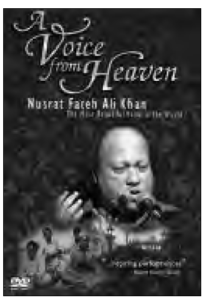Directed by Guiseppe Asaro
Produced by Guiseppe Asaro,
Alessandro Storza, Shafiq Saddiqui,
and Vikas Bhushan, MD
2001. DVD. Color. 75 minutes.
Distributed by Winstar Home
Entertainment
Web site:
http://dvds.ontheweb.com
Crossmedia Communications
419 Park Avenue South
New York, NY 10016
Reviewed by NATALIE SARRAZIN
 A voice from Heaven is a music documentary that provides a glimpse into the life of famed qawwali singer Nusrat Fateh Ali Khan along with information about the music of qawwali and the Sufi mystic tradition. Qawwali is a devotional music performed by Muslims primarily in South Asia. A significant expression of Sufism, it is believed to be a path for union with the divine. Qawwali’s poetry is derived from mystic Sufi poets such as Jalaluddin Rumi (1207–1273), and the qawwal (singer of qawwali) is believed to convey the very essence of Sufi mysticism through text and song. The vocal style is light classical in nature, and requires intense improvisation, flexibility, and a thorough knowledge of lyrical content. A rigorous and energetic performance style is highly desired, and Nusrat, considered one of the greatest performers in this genre, delivers accordingly.
A voice from Heaven is a music documentary that provides a glimpse into the life of famed qawwali singer Nusrat Fateh Ali Khan along with information about the music of qawwali and the Sufi mystic tradition. Qawwali is a devotional music performed by Muslims primarily in South Asia. A significant expression of Sufism, it is believed to be a path for union with the divine. Qawwali’s poetry is derived from mystic Sufi poets such as Jalaluddin Rumi (1207–1273), and the qawwal (singer of qawwali) is believed to convey the very essence of Sufi mysticism through text and song. The vocal style is light classical in nature, and requires intense improvisation, flexibility, and a thorough knowledge of lyrical content. A rigorous and energetic performance style is highly desired, and Nusrat, considered one of the greatest performers in this genre, delivers accordingly.
The documentary begins by describing the qawwali performance and its contexts in relation to the basic tenets of Sufi religious philosophy, all of which unfold through a number of brief interviews. Interviewees include South Asian London DJs, record producers, relatives, collaborators, and admirers of the genre and of Nusrat. The broad range of interviews provides diverse and interesting viewpoints, but several interviewees contribute little to the subject, and the film could do without them. Few scholars of qawwali are interviewed, however, although their commentary is excellent and informative.
After exploring the role of music among Sufis, the film addresses the often neglected but interesting role of women in qawwali, and includes some of the most poignant singing in the film, performed by several of Nusrat’s female students. An exploration of Nusrat’s family background presents his initial impetus for performing qawwali, and his significant public performances after the death of his father, who was also a qawwal. Nusrat is known outside of India and Pakistan primarily due to his association with popular music artists such as Peter Gabriel. A discussion of Nusrat’s “internationalization” also includes the controversy regarding use of his music in Hollywood film soundtracks. Nusrat is the most recognized and beloved qawwali singer, and his untimely death has left a void in the qawwali musical community. The film ends by introducing a possible successor, his nephew Rahat.
Nusrat Fateh Ali Khan, Rahat Nusrat Fateh Ali Khan, Nusrat’s nephew, and Farruck Fateh Ali Khan, Nusrat’s brother, provide music for the film. Although qawwali is played throughout the film, the variety of songs is limited and footage is drawn from only a few concerts. Using a select number of songs, however, does provide continuity for the film, and the cumulative effect makes an impact on the listener by the end of the documentary.
While the film is certainly appropriate for college, high school, and even middle school, both the content and the structure of the video require some preparation by the instructor, regardless of level. In terms of content, one unfortunate drawback is the film’s lack of emphasis on lyrics and poetry. Since the Sufi poetry is of primary importance, it would be highly beneficial to familiarize students with translations to illustrate the use of metaphor and depth of devotional expression. The technique used in formatting the documentary alternates short segments of concert footage and interviews, with overlying voice narration. The truncated concert clips, however, do not provide those unfamiliar with the genre to grasp an overall sense of the musical form, and students should listen to a qawwali song in its entirety.
This documentary is accessible to students with little or no familiarity with Islam, Sufism, or qawwali, but is equally interesting to those who are more knowledgeable. The narration is succinct and clear, and explains complex ideas in a straightforward manner that will provide abundant material for further classroom discussion.
SUGGESTIONS FOR THE CLASSROOM
Read examples of Sufi poetry and discuss the use of metaphor and symbolism.
Listen to a song in its entirety for its overall form and specific musical characteristics.
Compare the composition, performance practice, and function of the qawwali ensemble to other singing ensembles and devotional genres more familiar to students such as gospel.
Introduce the idea that each qawwali song is never a final product but rather an unfinished version—one improvisation or interpretation among many.
Discuss the role of women in Islam and in qawwali.
SUGGESTED LISTENING
Songs of the Mystics, Abida Parveen (a well-respected female Sufi devotional singer), Navras NRCD 5505/6.
The Sabri Brothers—Greatest Hits, Shanachie SHA 64090
Qawwali: Vocal Art of the Sufis, Nusrat Fateh Ali Khan, JVC World Sounds, VICG 5030
SUGGESTED READINGS
Barks, Coleman.1997. The Essential Rumi. San Francisco: Harper.
Barks, Coleman. 2002. The Soul of Rumi: A New Collection of Ecstatic Poems. San Francisco: Harper.
Schimmel, Annemarie. 2001. Rumi’s World: The Life and Work of the Great Sufi Poet. Boston: Shambhala Publications.
Wilson, Peter L. 1999. Drunken Universe: An Anthology of Persian Sufi Poetry, 2nd edition, Pacific Grove, CA: Cole Publishing Company.

